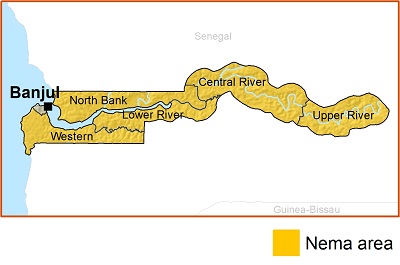National Agricultural Land and Water Management Development Project (NEMA)
IFAD Asset Request Portlet
Asset Publisher
National Agricultural Land and Water Management Development Project
The goal of this project is to reduce poverty among rural women and young people through improved productivity based on sustainable land and water management practices. The project responds to two major challenges in rural areas of country:
- Limited productivity and economic carrying capacity of land used for farming
- Poorly developed domestic markets, which generate very low real demand for the main produce of smallholders.
To address these challenges, the project supports watershed development and agricultural commercialization. And in order to consolidate and scale up the approach taken by ongoing IFAD-financed operations in The Gambia, it is nationwide in scope. The project targets poor smallholders, particularly women, who are the core producers of rice and vegetables throughout the country. A secondary target group is composed of market intermediaries, service providers and operators in the rice and vegetable markets, including producers' organizations and small and medium-sized enterprises.
Source: IFAD

President's reports
Project design reports
Project design reports
Supervision and implementation support documents
Supervision and implementation support documents
Supervision Mission, March 2017
Supervision mission, April 2016
Supervision mission, September 2015
Supervision mission, March 2014
Supervision Report, March 2015
Supervision Report, September 2014
Supervision Report, October 2013
Environmental and social impact assessment
Final environmental and social management framework
Interim (mid-term) review report
Interim (mid-term) review report
Resettlement action framework
PCR digest
Special study
Project list
Audit and Financial Statements
Audit and Financial Statements
Project completion report
Project completion report
Co-financiers
Related
Related
The Gambia: National Agricultural Land and Water Management Development Project
The project introduced various innovations, including tidal irrigation for rice production, village gardens to grow fruits and vegetables, roads to improve market access, soil and water conservation and ecosystem restoration, such as agroforestry and mangrove planting.